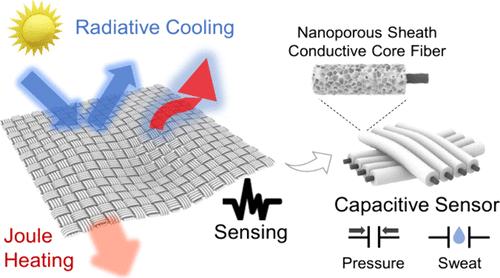Radiative Cooling Smart Textiles with Integrated Sensing for Adaptive Thermoregulation
IF 8.7
1区 化学
Q1 MATERIALS SCIENCE, MULTIDISCIPLINARY
引用次数: 0
Abstract
Efficient and adaptive thermoregulation of smart wearable technologies could revolutionize the mitigation of health- and energy-related challenges posed by climate change. We developed a woven, thermally adaptive smart textile (TAST) with high solar reflectance and selective infrared emittance and transmittance using a scalable coaxial extrusion method to continuously manufacture core–sheath fibers. TAST enables passive outdoor radiative cooling by 6–10 °C compared to normal fabrics while preserving good mechanical strength, breathability, and washability. Due to the integration of capacitive sensing, radiative cooling, and Joule heating into the woven fibers, TAST can detect the physiological signals of the human body and adapt its thermoregulation function in response to changes in the ambient temperature and perspiration level. The superior intelligence and multifunctional performance of TAST represent a paradigm shift beyond current personal thermal management technologies for enhancing human health, wellness, and performance.

具有自适应温度调节功能的集成传感辐射冷却智能纺织品
智能可穿戴技术高效、自适应的体温调节功能可彻底改变气候变化对健康和能源带来的挑战。我们采用可扩展的同轴挤压法连续生产芯鞘纤维,开发出一种具有高太阳反射率和选择性红外发射与透射率的热适应智能纺织品(TAST)。与普通织物相比,TAST 可使室外被动辐射冷却温度降低 6-10 °C,同时保持良好的机械强度、透气性和耐洗性。由于在编织纤维中集成了电容感应、辐射制冷和焦耳加热功能,TAST 可以检测人体的生理信号,并根据环境温度和排汗量的变化调整其体温调节功能。TAST 的卓越智能和多功能性能代表了一种超越当前个人热管理技术的范式转变,可增强人体健康、保健和性能。
本文章由计算机程序翻译,如有差异,请以英文原文为准。
求助全文
约1分钟内获得全文
求助全文
来源期刊

ACS Materials Letters
MATERIALS SCIENCE, MULTIDISCIPLINARY-
CiteScore
14.60
自引率
3.50%
发文量
261
期刊介绍:
ACS Materials Letters is a journal that publishes high-quality and urgent papers at the forefront of fundamental and applied research in the field of materials science. It aims to bridge the gap between materials and other disciplines such as chemistry, engineering, and biology. The journal encourages multidisciplinary and innovative research that addresses global challenges. Papers submitted to ACS Materials Letters should clearly demonstrate the need for rapid disclosure of key results. The journal is interested in various areas including the design, synthesis, characterization, and evaluation of emerging materials, understanding the relationships between structure, property, and performance, as well as developing materials for applications in energy, environment, biomedical, electronics, and catalysis. The journal has a 2-year impact factor of 11.4 and is dedicated to publishing transformative materials research with fast processing times. The editors and staff of ACS Materials Letters actively participate in major scientific conferences and engage closely with readers and authors. The journal also maintains an active presence on social media to provide authors with greater visibility.
 求助内容:
求助内容: 应助结果提醒方式:
应助结果提醒方式:


